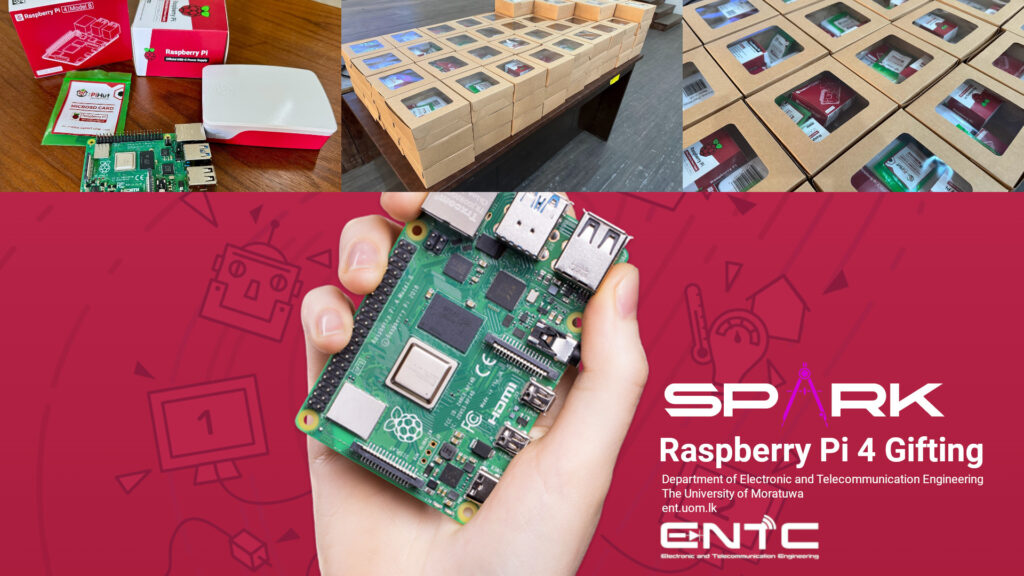University of Moratuwa Enhances Innovation with Raspberry Pi 4 Model B Gifting

Moratuwa, Sri Lanka – March 14, 2024 – In a significant step towards fostering technological innovation and hands-on learning, the Department of Electronic and Telecommunication Engineering at the University of Moratuwa has gifted Raspberry Pi 4 Model B kits to all 115 students of the 2021 intake. This initiative is a part of the SPARK program, which aims to encourage students to engage in innovative projects and challenges.
The Raspberry Pi 4 Model B, renowned for its robust capabilities, offers students a versatile platform for a wide range of projects. Equipped with a quad-core Cortex-A72 (ARM v8) 64-bit SoC, LPDDR4-3200 SDRAM, and dual-display support at resolutions up to 4K via a pair of micro-HDMI ports, the Raspberry Pi 4 is a powerful tool for developing complex computing solutions. Its gigabit Ethernet and USB 3.0 connectivity also make it suitable for high-speed data transfer and network projects.
The head of the department, highlighted the significance of this initiative, stating, “The Raspberry Pi 4 Model B kits provide our students with the essential tools to explore, innovate, and create. These devices will not only assist them in their coursework but also inspire them to participate in the SPARK Challenge and other innovative activities.”
Innovative Projects and Real-World Applications
The Raspberry Pi has already been instrumental in several notable student projects at the university. One such project, sponsored by Dialog Axiata PLC, is the Virtual Cycling Project. Utilizing a VR headset, this project enables users to experience virtual cycling through Sri Lanka’s breathtaking mountainous routes. The Raspberry Pi served as the primary controller, showcasing its potential in virtual reality applications.
Another impressive project involved digital IC replication, where the Raspberry Pi generated patterns to train a neural network module, demonstrating its capability in advanced digital signal processing and machine learning applications.
There have been numerous such project using Pis.
The SPARK Challenge: Driving Innovation
The SPARK Challenge is a yearlong endeavor designed to encourage students to develop unique and novel products that address the adverse effects of climate change. The challenge emphasizes the creation of sustainable solutions and aims to foster the growth of new commerce and industry in Sri Lanka. Teams of five students will present their solutions to external specialists in a format reminiscent of “Shark Tank” or “Dragons’ Den.”
To support the students, the SPARK program and the department provide comprehensive training and resources, including:
– Modern Design Workshops: Eight facilitated workshops that help teams formulate and deliver strong, innovative solutions.
– Briefing Sessions on UN Sustainable Development Goals (UN-SDGs): Guidance on developing sustainable products and services.
– Agile Methodology Training: Enabling rapid iteration of software and hardware solutions.
Dr. Ajith Pasqual expressed his optimism about the program, stating, “The SPARK Challenge is a platform for our students to not only demonstrate their technical skills but also to create impactful solutions that can drive sustainable development in Sri Lanka. We are excited to see the innovative ideas that will emerge from this initiative.” Nisitha Silva, Vice President of the Electronic Club that runs the SPARK program too spoke.
Fostering Future Innovators
By providing the Raspberry Pi 4 Model B kits, the University of Moratuwa is investing in the future of its students, equipping them with the tools needed to excel in the rapidly evolving tech landscape. This initiative aligns with the university’s commitment to fostering innovation, creativity, and practical problem-solving skills among its students.
The SPARK program and the gifting of Raspberry Pi kits symbolize a forward-thinking approach to education, where students are encouraged to push the boundaries of what is possible and contribute to the technological and industrial growth of Sri Lanka.
For more information on the SPARK program and the innovative projects at the University of Moratuwa, please visit [University of Moratuwa – Department of Electronic and Telecommunication Engineering.

